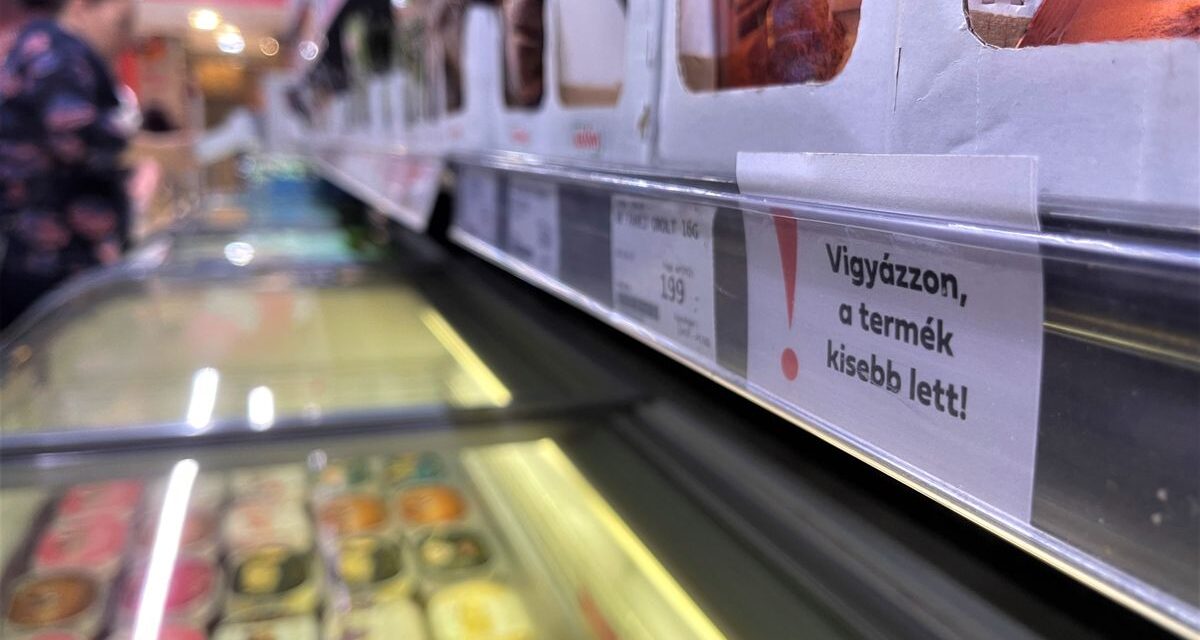"Watch out, the product has become smaller!" despite the marking, the selected goods will be added to our basket, so for now the awareness campaign has not had any effect on traffic.
Manufacturing practice will be affected by the shrink inflation regulation, Tamás Kozák, the new Secretary General of the National Trade Association, told Economx about the effects of the measure.
Since the introduction of the food price cap, many additional measures have been taken in trade to protect consumers. Such was the launch of mandatory in-store promotions and the online price monitoring system, and most recently, from March 1, a campaign to draw attention to the shrinking packaging of products.
To protect consumers
The latter is the government's response to shrinkflation, which is what we talk about when the packaging quantity decreases parallel to the price of certain products remaining unchanged or even increasing. As a result, consumers can get less for their money from the purchased product.
The shrinking inflation bomb first exploded in France, but in addition to the Hungarian government, decision-makers in Germany also focused on the issue,
in fact, the issue has reached the stimulus threshold outside of Europe as well: in the United States of America, Canada, Brazil and South Korea as well.
We have already summarized the experiences of the first month of the measure, but in the continuation we were also interested in the opinions of the traders. That's why we asked the National Trade Association (OKSZ) how much of a challenge the preparation of the awareness-raising campaign and compliance with the new rules posed to the sector, whether consumer habits are affected by the "Watch out, the product has become smaller!" placement of markings, what can be known about the practice of inspections and fines, and what longer-term effect the measure may have. By definition, the key here is whether it influences food inflation, and from this approach, where does the industry place the already introduced price stop, then the mandatory actions and the price monitor.
The transition was largely smooth, the legislative preparation already started last year
- answered Tamás Kozák to Economx, who replaced György Vámos in the position of secretary general of OKSZ on March 23. The specialist reported that the measure had no negative or positive effect on turnover, since the member companies involved did not perceive a substitution effect that significantly influenced turnover, i.e. based on his answer, there was no shift towards substitute products for the concerned goods the demand.
Manufacturer practices may vary
Tamás Kozák said that "there are checks and the member companies are doing everything they can to comply with the regulations". As for the expected further impact of the measure, the general secretary of the trade association predicted: "manufacturer practice will be affected by the shrinking inflation regulation". He added that
the burden of the price cap and the mandatory action is largely financed by the traders, who thus contributed tens of billions of HUF to the livelihood of Hungarian families.
When it was announced that Kozák would replace Vámos, they also announced that OKSZ would be renewed - with the active participation of the new general secretary. The goal is to allow commercial enterprises to operate in a regulatory environment that ensures a predictable operating environment in the longer term.
"The organization strives for close professional relations and intensive communication with each and every stakeholder, such as economic policy decision-makers and partner organizations. The association, whose members include companies handling a significant proportion of retail trade and small and medium-sized enterprises in the sector, considers it important that the expectations of customers are met at the highest possible level, taking into account market economy standards. OKSZ, in view of the economic weight of its member companies, wants to be a prominent partner of the government when making trade-related decisions," they stated.
The recovery has begun
If we take a look at the relevant statistics for the players in the sector, we see that retail trade increased by 1.1 percent on an annual basis in February, but decreased by 0.6 percent compared to January. It was highlighted at the Ministry of National Economy: in terms of the annual comparison, the volume of traffic increased continuously in the first two months of 2024, which can now be stated to have passed its lowest point and entered the recovery phase after a 13-month decline.
Featured image: Metropol/Richard Fügedi












